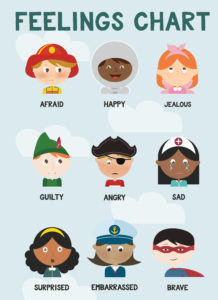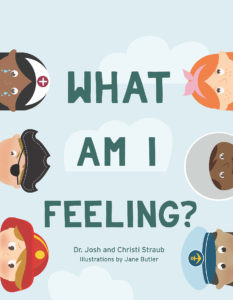A Conversation with Dr. Josh and Christi Straub, authors of What Am I Feeling?
Mar 18th
 Josh (PhD) Straub serves as Marriage and Family Strategist for Lifeway Christian Resources. Together, Josh and Christi (MA, MBA) also co-founded Famous at Home, an organization equipping leaders and their spouses in emotional intelligence and family wellness. They are Fellows of the Townsend Institute for Leadership and Counseling and host a weekly In This Together podcast and lead TwentyTwoSix Parenting. Josh and Christi have two fun and feisty kids, Landon and Kennedy.
Josh (PhD) Straub serves as Marriage and Family Strategist for Lifeway Christian Resources. Together, Josh and Christi (MA, MBA) also co-founded Famous at Home, an organization equipping leaders and their spouses in emotional intelligence and family wellness. They are Fellows of the Townsend Institute for Leadership and Counseling and host a weekly In This Together podcast and lead TwentyTwoSix Parenting. Josh and Christi have two fun and feisty kids, Landon and Kennedy.
Josh and Christi’s latest book is What am I Feeling? In a world where kids are dealingwith everything from sibling rivalry to bullying, divorce to tragedy, What Am I Feeling? offers a biblically grounded way for children to verbalize their feelings, develop empathy and self-control, and understand their wonderful God-given emotions. We had a chance to talk with Josh and Christi about their new book and how they hope God uses it in the lives of kids.
What inspired you to write this book together? Who is the book for?
As trained counselors, and honestly, as parents who go to therapy ourselves, we understand the role emotions play in the overall health of a human being. We have had great feedback about Josh’s book, “Safe House: How Emotional Safety is the Key to Raising Kids Who Live, Love, and Lead Well,” but it’s a parenting book. Parents don’t often have the time to read a book. However, we read books to our kids all of the time. Our desire was to put a tool into the hands of the parent that helps put practical language to helping their kids, from an early age, begin labeling their feelings and create emotional safety in the home. The book is geared toward kids approximately ages 4-8.
Why is it so important that kids understand at an early age that “a feeling is just a feeling—it’s not in charge of you”? How have you helped your own kids in learning this?
Children don’t come into the world knowing what it’s like to experience an emotion. Unfortunately, as fallen human beings, if we don’t know what to do with our negative emotions, in particular, we will learn to alleviate them in unhealthy ways by either suppressing them or medicating them. Spiritually speaking, we turn to idols to calm and soothe the pain.
But both research and the Bible show that being able to recognize an emotion and label it, helps us know what to do with it in a healthy way. In other words, the sign of a healthy brain is being able to verbalize what we feel and why we feel that way in a given situation. Spiritually speaking, think of the fruit of the Spirit to include self-control. We don’t believe you can be spiritually mature while remaining emotionally immature.
Furthermore, emotional intelligence is overwhelmingly linked in the research to self worth, relational satisfaction, success in the workplace and to the ability to empathize. Who doesn’t want these outcomes for their kids? Scripturally, the second greatest commandment requires that we love our neighbor as we do ourselves. If we have an inability to label our own feelings, it’s seemingly impossible to step into the shoes of another and love him or her well.
So the more emotionally aware our kids become, the better they can relate to others. And the gospel message of developing a deepening relationship with Christ, and the call to love others, is exactly that: all about a relationship. The better we recognize emotion, the better our ability to share the gospel in a relationally healthy way and love others well!
One of the ways we do this is literally getting on our kids’ eye level and looking them squarely in the eye when they are overwhelmed. We ask them to label what it is they are feeling or, if they can’t, to tell us what feels overwhelming to them. There’s a really helpful phrase in the world of neurobiology, “Name it to tame it.” When our kids can verbalize and put words to what they are feeling, it literally has a calming effect because it helps the child to regain control.
 How can parents use this story to talk to their kids about emotions and feelings in a biblical way? What about the pull-out chart?
How can parents use this story to talk to their kids about emotions and feelings in a biblical way? What about the pull-out chart?
The characters in the story all mistakes with their emotions. We all do. But the beauty of the story is how they learn to act in spite of what they are feeling.
Using the parent guide online for the book and having your children memorize important verses about emotions (like Eph. 4:26, James 1:19, Phil. 4:6-8, Prov. 16:32) will serve as great supplements to the book.
And quite honestly, for parents, it’s too easy when we’re busy or overwhelmed to grow frustrated or come down hard on our kids when they are overwhelmed in emotion, assuming they are being disobedient; when the reality is, they are just trying to figure out this weird experience they’re having with an inability to control it. Paul tells us to go to the God in prayer when we’re anxious and he’ll give our minds peace to think straight again (Phil. 4:6-8). If Paul tells adults to go to God to calm down and think straight when they’re anxious, how much more do our kids need us in these moments to teach them what to do?
What do you hope parents and their kids take from this story?
We hope that parents learn that one of the best parenting techniques, if you will, is coaching our kids how to use emotion to make decisions, rather than allowing the emotion to drive the decision.
We hope kids learn that emotions were given to us by God as a way to tell us about a situation. And that as a result, they learn to more readily label what they are feeling in themselves and also begin to empathize with other people.
Tell us about your forthcoming study, “Homegrown.” Can these products be used together? What prompted you to write a Bible study component?
Homegrown is a 6-week Bible study on the fruit of the Spirit. It includes group questions, discussion prompts and activities parents can do with their kids to begin cultivating the fruit of the Spirit in their lives.
As we mentioned earlier, spiritual and emotional maturity go hand-in-hand, and nowhere is that more evident than growing in love, joy, peace, patience, kindness, gentleness, faithfulness, goodness and self-control. We really wanted a tool that helped parents introduce their kids to the work of the Holy Spirit in their individual lives so that growing relationship would lead them to love others well.
You Might Also Like
Lifeway lleva a cabo exitoso lanzamiento internacional de la EBV en Ciudad de México
Reflexión: Ausencia divina
Lifeway llevó a cabo la conferencia Transformados a Su imagen en Monterrey, México
La Importancia de Utilizar la Biblia Adecuada para un Estudio Detallado
Lifeway / B&H Español presente en Fieles a Su Llamado 2023
